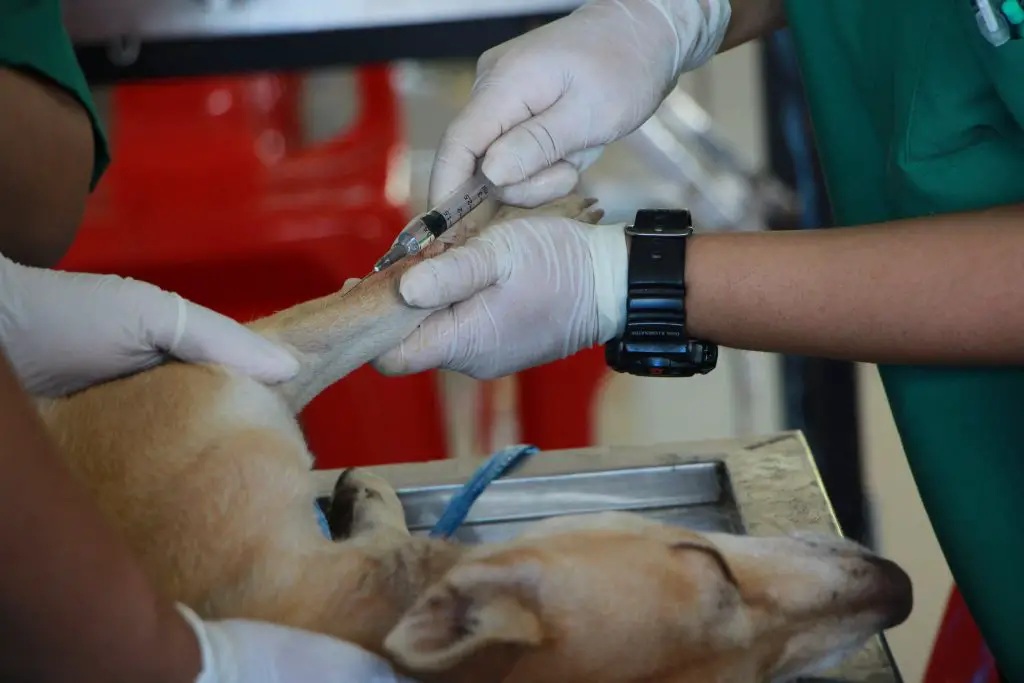Table of Contents
- what is kidney disease in dogs?
- What are kidney disease treatments for dogs?
- What kind of considerations do I have to keep in mind for a kidney diet for dogs?
- What’s in a kidney diet for dogs?
- Other special considerations to keep in mind
- Can I feed my dog Commercial Dog Food?
- Should I Do a Homemade Diet Instead?
- Conclusion
Renal disease is no small thing to sneeze at. In both humans and animals, a problem with the kidney can cause really big problems in the long run. In fact, in some cases it can even prove fatal, particularly in the case of acute renal/kidney failure. Nobody ever wants to lose a loved one or a beloved pet to something as terrible as kidney disease, especially when the patient can end up with terrible pain and suffering that can really make their last days horrible. These are truly situations nobody would ever wish on their enemies, either. But if your dog has already come down with chronic kidney disease (due to old age, for example, you may want to put them on a kidney diet for dogs. Kidney diets are specifically formulated to help manage your pup’s kidney condition and prevent flareups, for example.
There are many different ways that you can help manage chronic kidney ailments in canines, and a kidney diet for dogs is just one of them. However, a proper diet can truly go a long way in prolonging your dog’s life and helping them have a better quality of life overall throughout the remainder of their years. If you are here looking to make your dog’s life better even though they have to live with chronic kidney disease, we commend you. Luckily, we’re here to help you learn all that there is to know about a proper kidney diet for dogs so that you can adjust and do everything in your capacity to make your pup’s life so much better.
If you are ready then so are we – let’s get started!
what is kidney disease in dogs?

Before we take a dive into the world of therapeutic diets, 1st we want to talk about everything that is involved with kidney disease, at least in dogs that is. Like humans, dogs are actually capable of living on just one kidney should there ever be a situation where one has to be taken out. However, kidney failure can and will result in a puppy’s death, especially if left untreated. Actually, we talk a lot more about acute kidney failure and chronic kidney disease in this article that we have posted . Therefore, if you want to know more about the prognosis of kidney disease in canines, you can read that article in that link above.
Nevertheless, here is a quick primer: kidney disease is something that can come on over a period of months or years. If this is how it occurs, or if it occurs in a dog’s old age, then it is most likely considered to be chronic kidney disease. Chronic kidney conditions can basically cause flare ups in pups that can become worse over time. However, while CKD (chronic kidney disease) is manageable, there is no actual cure. If your pup has a chronic condition, the best that you can do is to make them as comfortable as possible so that they can live the rest of their lives much more easily. Although chronic kidney conditions are basically considered fatal overtime, one thing that you should know is the fact that you can with proper care help your dog to survive months or even years before they pass away.
What are kidney disease treatments for dogs?
If you want to know more about the ways in which you can treat kidney conditions in dogs, You can also refer to the very same article that we have linked above. In that article, we have included an in depth guide to how you can help keep your dog more comfortable in the long run as they battle their condition.
Basically, treatments for CKD and acute kidney failure include things such as a kidney diet for dogs, fluid treatments, vitamins and supplements, and in extremely rare cases dialysis and transplant (we cannot stress how rare of a case this is – finding veterinarians and hospitals that actually do dialysis and transplant for dogs is incredibly difficult and rare).
What kind of considerations do I have to keep in mind for a kidney diet for dogs?
Remember that our kidneys function to help clear the body of toxins that would otherwise affect us very negatively. The same applies for dogs – their kidneys have the main function of filtering their blood to remove any toxins that could prove fatal to them. It is for this exact reason that acute kidney failure or acute renal failure occurs when a dog accidentally consumes something that their body cannot breakdown or safely pass. Toxins and poisons such as those found in certain types of nuts, rat poison, and the like can all cause a dog’s kidney to shut down.
Therefore, if you have a dog that is currently facing kidney failure or chronic kidney conditions, certain considerations need to be made to make sure that their kidneys are relieved of the burden. People who are suffering with chronic kidney conditions essentially have kidneys that are functioning at much less than what they normally should or would be. The very same could be said for dogs, which is certainly why a pup that is suffering from a kidney ailment needs to have a diet specifically designed to relieve their kidneys from constant stress.
Many nutritional changes need to be done in order to help a dog live longer and more comfortably with CKD. These changes will depend on how severe the progression of the disease is in your dog. Unfortunately, a kidney diet for dogs may not always be appealing or appetizing to them. It is for this reason that you must find a way to make the diet work.
What’s in a kidney diet for dogs?

With all of that said above, let’s take a look at what a dog with kidney disease would normally eat. Generally, dogs that have kidneys that aren’t perfectly functioning will require diets adjusted to have reduced protein content, reduced sodium content, and of course, reduced phosphorus content. The three things that we have mentioned essentially create a heavier burden on the kidneys, which is exactly why they must be greatly reduced or eliminated from the diet of dogs that suffer CKD.
On top of producing the three mentioned above, dogs with kidney conditions should also have their diet supplemented with Omega 3 fish oil fatty acids. This can help improve the dog’s general health and also prolong their lifespan as they battle their conditions.
Lessening Phosphorous in the Diet
We do want to make a note of something, however: of the 3 things that you want to reduce from a dog’s diet that we have mentioned above, the most important thing is phosphorus. You really want to be your dog a diet that is low in phosphorus to help keep the levels low in the blood. Studies have found that a lower phosphorus level in the bloodstream correlates with a slower progression of kidney conditions that can then result in improved chances of survival.
Lessening Protein in the Diet
You may not know this, but one thing that the kidneys process regularly is protein. The kidneys are essentially responsible for helping the body to get rid of waste products that come from protein in food. This is why you will find that a kidney diet for dogs will recommend greatly lessening protein intake. Doing so will help in minimizing waste product buildup in the bloodstream as the vital kidneys struggle and fail. Again, feeding your dog a diet that is much less protein-oriented can really help in increasing the amount of time they survive with CKD.
One thing that you should remember when it comes to watching protein intake is also taking into consideration whatever treats you normally give your pet. Treats will also have protein in them, particularly those like jerky treats, rawhides, meats, cheeses, and even pig ears. If you still want to spoil your dog and give them treats as rewards here and there, or even if you just want to give them treats because you love them, you can find alternatives to give your pet instead. Might we suggest a fruit that is low in sugar or perhaps something like a carrot?
Lessening Sodium in the Diet
Even in humans, high sodium diets can cause many complications in health. For example, a diet that is high in sodium cannot only worsen damage done to the kidneys, but it can also increase the burden on already struggling organs. This is exactly why the diets that are designed for dogs who have CKD are low in sodium by nature. By reducing the amount of sodium that the kidneys will have to process, you then lessen the burden on these critical organs and help to increase the lifespan of your dog. Additionally, you will also find that less sodium in the diet also means less risk of high blood pressure which is great if your dog is also suffering from hypertension or heart disease.
Other special considerations to keep in mind
Another thing that we want to mention when it comes to dogs suffering from kidney ailments is the fact that the body’s pH balance is thrown off kilter. This is exactly why you will find that veterinarians may sometimes prescribe antacids to dogs that are struggling to keep a normal stomach and digestive tract. because the kidneys are also responsible for keeping the body’s pH balance normal, dogs with CKT or acute kidney failure will greatly struggle to function normally.
Therefore, on top of antacids prescribed by the veterinarian you may also find that adjusting your pet’s diet to be non-acidifying can be extremely helpful in keeping them comfortable. Yes, for sure it can be a great hassle to keep up with all of your dog’s dietary needs and requirements. However, in following all of them you have a greater chance of increasing the time that your pet survives to live months or even years longer than their prognosis.
Can I feed my dog Commercial Dog Food?

The answer to this question is yes – there are many companies out there that have formulated and designed kibble (or even wet food) specifically for pets suffering from kidney conditions. If you want to simplify your search for a kidney diet for dogs, this is one good way to do it. After all, you only need to shop around for a brand that your pup will enjoy and actually eat. Chances are, most of these specially formulated foods are designed to have reduced protein, phosphorous, and salt. They will also very likely contain the things that can help supplement your pup’s diet such as Omega 3.
You can look for commercial kibble that is made with limited ingredients formulas to be far more gentle on sensitive stomachs, as well.
However, the challenge with using commercial dog food is that sometimes your pet may not take a liking to the kibble be it due to the smell, the taste, or the appearance. When a dog suffering kidney ailments already has a lowered appetite, how do you make sure that they eat?
Some people suggest that you can mix in “treats” with the kibble such as a low sodium vegetable broth to make it more appetizing. A warm veggie broth (low in salt!) poured over the bowl of kibble can improve the aroma and attract a dog to start chowing down. You can also include treats such as cut up fruits (approved by your veterinarian of course) or chopped up carrots.
Should I Do a Homemade Diet Instead?
Some pet owners go the extra mile by making their kidney diet for dogs completely customized and homemade. This isn’t necessary, but if your dog is especially finicky and picky with their food, it may be of great help. Making a homemade diet is also an extra step that would certainly be helpful – as long as you have the time to do it, of course.
Remember, however, that you must consult with your vet about the food you plan to give your dog. Your veterinarian will be able to take a look at the diet and suggest alterations that can help to make sure you are giving your pup a holistic diet that includes all of their nutritional needs while still keeping in consideration their condition.
Homemade diets can get expensive however, so be ready to swallow the cost both in time spent and money spent for ingredients.
Conclusion
Although it is certainly saddening to know that CKD cannot be cured but only managed, the fact that a lot of people are becoming more aware of what a kidney diet for dogs can do is optimistic. With further research in the future, we hope that kidney conditions will become less fatal overall.
We hope that this article has helped you figure out what you need to do for your dog’s diet. Remember – if you are unsure, make sure to ask your vet because they are the only one who will know your dog’s individual case. A vet is the best person to approach for specific individual advice!
